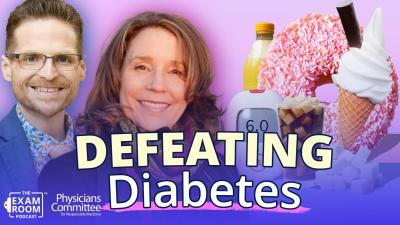Dietary Guidelines Recommendation for 3 Servings of Dairy Daily Increases Breast, Prostate Cancer Risk

Research shows that three servings of milk a day can increase breast cancer risk by up to 80% and risk of death from prostate cancer by 141%. So why do the Dietary Guidelines for Americans recommend up to three servings of dairy a day?
The breast cancer study, which was funded by the National Cancer Institute, the National Institutes of Health, and the World Cancer Research Fund, followed 52,795 women who were part of the Adventist Health Study-2 cohort and found that women who consumed 1/4 to 1/3 cup of cow’s milk per day had a 30% increased chance for breast cancer. One cup per day increased the risk by 50%, and 2-3 cups were associated with an 80% increased chance of breast cancer. Replacing dairy milk with soy milk was associated with a 32% reduced risk of breast cancer.
When asked about the milk recommendations in the Dietary Guidelines, the lead author of the study, Gary E. Fraser, MBChB, PhD, said that “people should view that recommendation with caution.”
Research has also shown consuming cheese increases breast cancer risk.
The prostate cancer study found that those who consumed three or more servings of dairy products a day had a 141% higher risk for death due to prostate cancer compared to those who consumed less than one serving. Both high- and low-fat dairy products were associated with increased mortality. Previous research found an increased risk of prostate cancer for those who consumed ≥ 2.5 servings of dairy products per day, compared with those who consumed ≤ 0.5 servings a day.
Scientific evidence also shows that milk and other dairy products increase the risk of ovarian cancer, asthma, cognitive decline, and early death, and offer little if any protection for bone health. Dairy products are also the No. 1 source of saturated fat in the American diet, which increases the risk of heart disease.







